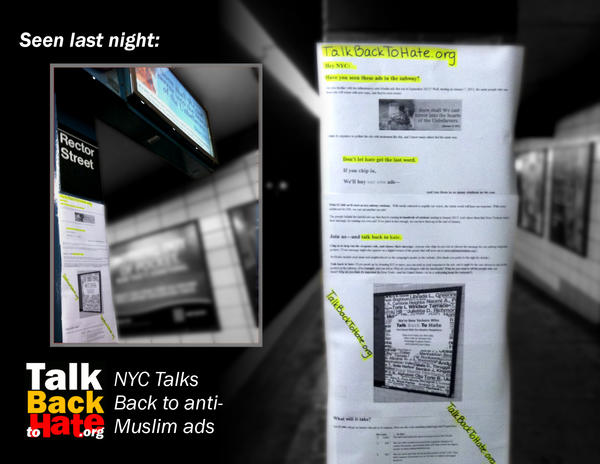

By: Hayes Brown
Source: thinkprogress.org
A grassroots campaign aimed at countering hateful anti-Muslim ads in New York’s subway system has gone live, placing posters in ten locations across New York City.
Called Talk Back to Hate, the campaign first launched its crowdfunding appeal in January in the aftermath of Hurricane Sandy, seeking to raise the money necessary to post advertisements in major subway stations from among the citizens of New York.
“I started the project because, like many people I’ve spoken to, these ads feel like an attack on our most basic communal values,” Akiva Freidlin, the creator of the project, said in an interview with ThinkProgress at the time. “They’re doubly offensive, for both attempting to demonize and intimidate individual members of a particular religious group, and trying to exploit the city’s grief and anger.”
Talk Back to Hate’s poster message was chosen from various suggestions submitted by contributors to the campaign. The image depicts a pair of arms wrapped around the Big Apple that is New York and the winning words “Hatred is easy. It is love that requires true strength.” The poster also features the names of those who donated to make the poster a reality. The ad is currently running at some of the New York subway’s most-trafficked stops, including Times Square and Rockefeller Center, as well as eight other locations throughout Manhattan and Brooklyn. Fundraising for a second round of ads is already on-going.
A digital version of the ad posted on the Talk Back to Hate website cycles through messages submitted by the campaign’s contributors. In a press release sent out by the campaign, Friedlin highlighted the several of those messages from New York City residents who donated to the project:
Campaign donor Omar Gaya is an American Muslim who moved to NYC about 2 years ago from California to work at a bio-pharmaceutical company. He calls TalkBackToHate.org “the voice of a formerly ‘silent’ majority.”
“We must raise our voices,” Gaya notes, “or else we risk letting the hatred of a few well-resourced individuals dominate the discourse and hijack the values of freedom and tolerance that we hold dear.”
Jessica Nepomiachi, a public policy & community outreach consultant, said that she gave in appreciation for the complexity and diversity of New York. “The NYC transit system carries millions of people a day through one of the most diverse cities in the world,” Nepomiachi says. “Our transit system should be a place of pride, a place to encourage thoughtful and peaceful dialogue, not hatred.”
The spark that launched the campaign was a series of Islamophobic subway ads funded by Pamela Geller’s American Freedom Defense Initiative that ran in New York City and Washington, DC last year. Much as in the case of the ads that inspired Talk Back to Hate, the original series of ads from Geller — which referred to Muslims as “savages” — were likewise countered by various religious and civil groups.



